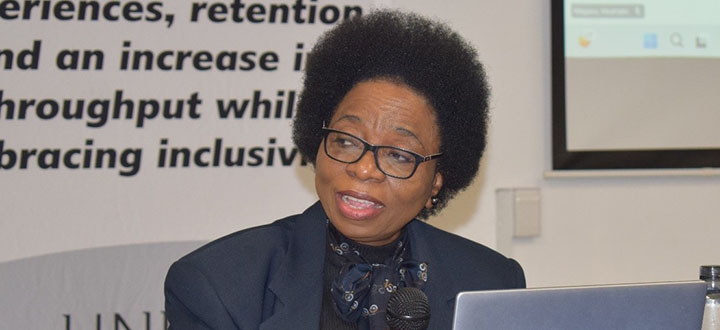News & Events
DTSFL supports incarcerated students and students at regional centres
In alignment with the Unisa 2030 strategy and the Department of Tuition Support and Facilitation of Learning (DTSFL) operational plan, the DTSFL, as a collective together with colleges, the Department of Student Funding (DSF), regional centres and other allied stakeholders, recently undertook strategic visits to correctional centres and regions, to enhance support for Unisa students. including students who are incarcerated.

Prof Meahabo Magano, Executive Director: DTSFL
On 9 October 2024, the team visited the Brandvlei Correctional Centre in Cape Town, followed by a visit to Kgosi Mampuru on 10 October. During these visits, the team engaged directly with 74 students in Cape Town, while many others from Kutama Sinthumule and Mthatha Correctional Services connected virtually. At Kgosi Mampuru, 36 students attended in person and many others participated via online links.
The visits provided a platform for students to voice their concerns regarding various academic issues. Information on key services was presented, including tutorials, work-integrated learning (WIL), recognition of prior learning (RPL), myUnisa, digital learning, first-year experience (FYE) support, and Language Services. Students were encouraged to ask questions about academic integrity, applications, registrations, library services, and student counselling.
Professor Meahabo Magano, the Executive Director of DTSFL, stressed the importance of continued collaboration with the Department of Correctional Services (DCS), to enhance the assistance provided to students. The education facilitators at the correctional centres were also given an opportunity to comment on issues they encountered in relation to Unisa.
Among the concerns shared, students highlighted matters related to proctoring, mentioning the restrictions they faced on camera usage during assessments. The DTSFL team and the DCS reached an agreement that incarcerated students would generally be exempt from adhering to proctoring requirements. The students were reminded to submit accurate student numbers, to ensure that they qualified for this exemption.
Another significant concern involved the timing of continuous assessment modules, with students requesting extended deadlines and greater flexibility around tutorial sessions, to accommodate their restricted hours of access.
One student at Kgosi Mampuru expressed an interest in the RPL programme, seeking clarification on whether the work experience he gained during his incarceration would afford him equal opportunities. Dr Phumza Makgato-Khunou, Director of the Directorate Instructional Support and Services (DISS), committed to evaluating this request.
Students at both correctional facilities voiced appreciation for the support received from their lecturers, and requested downloadable lesson materials due to limited internet access. They also sought printed materials for their modules, so as to continue their studies while locked in their cells. Concerns were raised about textbook delivery times from the library, as students reported often receiving materials too late, to be of use.
Funding, particularly for postgraduate students, was a pressing issue, with many noting that existing bursaries do not meet their needs. A commitment was made to develop a proposal for study bursaries specifically designed for incarcerated students, with a view to enhancing their educational opportunities.
The discussions also touched on practical requirements, with students in programmes such as Animal Science lamenting their lack of exposure to vital practical experience. Law students expressed a desire to participate in moot court activities. In response, engagement with the College of Agriculture and Environmental Sciences (CAES) and the College of Law (CLAW) law clinic is underway, to explore these requests.
The DTSFL team concluded its visits with a renewed commitment to design and implement projects that will strengthen support services for all students, including those in correctional facilities.
A regional visit which took place on 7 October 2024 saw the team split up, going to Mthatha and East London to provide feedback on commitments made during the 2023 regional visit. The final stop was in Parrow, Cape Town, where each unit and directorate reported on progress made. An emotional moment arose when a student shared her struggles with a module that stood between her and graduation. She received immediate support and encouragement to maintain communication with her tutors and lecturers.
Both incarcerated students and those at the regional centres expressed dissatisfaction with specific modules, citing a lack of support and confusing materials. Magano concluded the meetings with a pledge to the students that her team will develop long-lasting solutions to the issues raised.
As we continue to promote education and ensure a supportive environment for our students, we wish each Unisa student the best of luck in the upcoming examinations.
* By Khongelani Chauke, Quality Champion, DTSFL
Publish date: 2024/11/05
